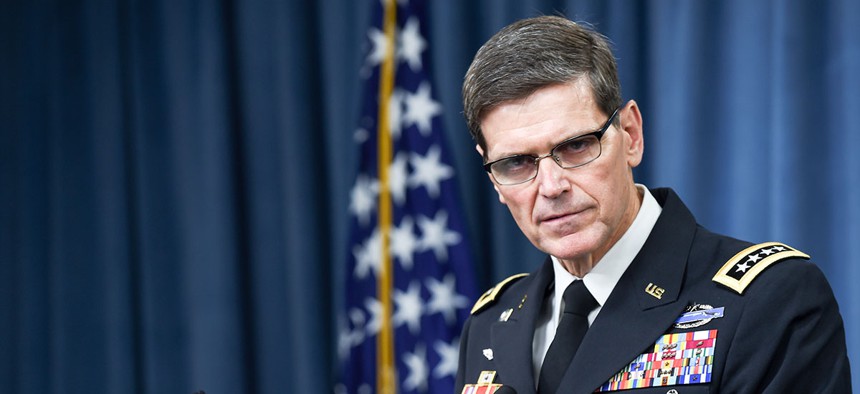
Gen. Joseph Votel, commander, U.S. Central Command, told Congress that the U.S. needs to use "a combination of all of our elements of power — hard power and soft power." Sgt. First Class Clydell Kinchen/ Army
ISIS War Generals to Congress: We Need the State Department
One week after Trump proposed shifting billions from the State Department to the Pentagon, two of the top U.S. generals in the Middle East and Africa say they need diplomatic help.
If President Donald Trump wants to “start winning wars again,” he would do well to fund the State Department’s non-military work in the Middle East and Africa and plan for long-term political solutions, the two top U.S. commanders leading the fight against the Islamic State and other terrorist groups those regions told Congress .
One week after Trump released his first budget request — which would shift $54 billion to the Pentagon’s budget next year with a commensurate slash in foreign aid and domestic non-defense spending — Gen. Joseph Votel, commander of U.S. Central Command, and Gen. Thomas Waldhauser, of U.S. Africa Command, offered a robust defense of soft power engagement before the Senate Armed Services Committee.
“We could knock off all the ISIL and Boko Haram this afternoon; but by the end of the week, so to speak, those ranks would be filled,” said Waldhauser, in a Thursday hearing. “Many people, especially those in uniform, have said we can't kill our way to victory here.”
“The short answer is no, we cannot [win the war without soft power],” he said.
Since releasing his budget request for fiscal year 2018, Trump has pledged to “totally obliterate” ISIS, and said “we don’t fight to win,” and “we have to start winning wars again.” But in the hearing today and in other public remarks senior U.S. generals have said the same thing previous top war commanders have said for many years about fighting terrorism — they believe that success requires more than a quick military campaign.
“A solely military response is not sufficient,” Votel said in his written testimony. “We want to increasingly involve other elements of the U.S. government and the international community, recognizing that it is only through a combination of capabilities that we will achieve and sustain our strongest deterrence posture.”
It’s not a new development that senior military officials want Washington to increase counterterrorism spending at the State Department and U.S. Agency for International Development. To help speed President Barack Obama’s counter-insurgency strategy in Iraq and Afghanistan, then-Defense Sec. Robert Gates and Secretary of State Hillary Clinton urged non-defense funding increases at various levels that never came, from either the White House or Congress. Gates even offered to call up reservists in civilian clothing to handle non-combat roles like agricultural planning and construction, but the idea never moved forward.
Trump has billed his proposal a “national security budget,” promising that it would “rebuild” the military and equip the services with thousands of additional troops and new planes, ships, and equipment.
“This defense spending increase will be offset and paid for by finding greater savings and efficiencies across the federal government,” the president said while introducing his budget before the National Governor’s Association, in February. “We’re going to do more with less.”
But Votel and Waldhauser’s remarks — and the senators’ questions that elicited them — highlight the difficulties Trump’s proposed budget will have on Capitol Hill. Sen. Jack Reed, D-R.I., the committee’s ranking member, and new-addition Sen. Elizabeth Warren, D-Mass., both emphasized the importance of soft power in their allotted time.
“There's a big debate going on right now, as you know, about military spending and, of course, we need a strong military, but the military is not the only element of our national security strategy,” Warren said before asking Votel and Waldhauser if they thought State Department and other civilian agencies were “a waste of time and taxpayer money?”
Votel’s response: “I do not, Senator.”
When Trump first announced his budget in February, Senate Minority Leader Charles Schumer, D-N.Y., said the cuts were a “poison pill” for Democrats.
Sen. Lindsey Graham, R-S.C., who also chairs the Senate Appropriations Subcommittee on Foreign Operations, said last month that Trump’s budget is “dead on arrival.”
Graham’s appropriations subcommittee hosted a hearing earlier this week with eastern and central European diplomats where he called for a soft power fund to help allies counter Russian interference. He beat the soft power drum again in today’s hearing, this time in relation to another adversary.
“Any budget that we pass that guts the State Department, we’ll never win this war,” Graham said in today’s hearing. “In fact, ISIL will be celebrating.”







